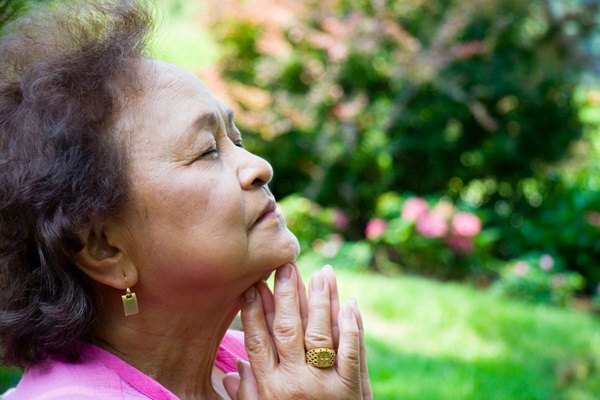When Linda Douty’s friend died from a brain tumor, the event sent the lifelong United Methodist on a spiritual spiral as she sought to understand why the prayers of many failed to result in her friend’s healing.
“She was fit, successful, all of the plusses in life you can imagine,” Douty shares about her 50something-year-old friend. “Every prayer group I knew was praying for her. And she died.”
“Wait a minute,” she remembers thinking, “This doesn’t add up to what I’ve been taught.”
When she shared her confused anguish with her pastor, he counseled, ““When I feel like you feel right now, I pray, because Jesus prayed.”
At the time, Douty thought the answer was “glib,” she recalls. Thirty years later, Douty, who is a spiritual director in Memphis, Tennessee, doesn’t have a better response.
“It was an unsatisfactory answer at the time,” she shared. “But I call myself a Christian, a follower of Jesus. And what did Jesus do? He prayed in every circumstance. He prayed when he was happy, when he was sad, when he was bewildered, in the Garden of Gethsemane, even on the cross. So whatever this mystery is, Jesus thought it was important. “
The acts of asking for prayer, praying for others, reciting prayers together are built into our faith tradition. Jesus modeled it, we repeat it. But do we understand it? United Methodist spiritual leaders offer help unraveling the complexity of prayer, and, perhaps in doing so, leading us to accept the mystery and seek a deeper connection with God.
Unanswered prayers
Like Douty, many people struggle with prayers that aren’t answered in the ways we want.
“When people say, ‘God didn’t answer my prayer,’ I always say, ‘You’re in good company and I point to the lament in the Psalms,” shares the Rev. Claire McNulty-Drewes, a United Methodist pastor in the Mountain Sky Conference.
“I do pray for miracles and I believe in miracles. And I’ve seen miracles. But I also know the human body is an insidious thing. I don’t know why a child gets cancer. It seems unfair. I don’t know why car accidents happen to some people but not to me,” McNulty-Drewes shares. “The lament psalms remind me I’m not the only one who may be questioning if there really is a God.”
To make a specific request when praying to God is common. Our church services are filled with prayer times where we share “joys and concerns” – and mainly, concerns – with one another, asking God for healings, jobs, safety, positive outcomes.
“Viewing prayers as merely requests is transactional,” explains Sally Sharpe, a United Methodist and spiritual director in Mt. Juliet, Tennessee. “I’m coming to you because I want something. If my prayer is successful, I’ll get what I want. And I think a prevalent understanding of prayer is transactional. But I believe it’s experiential, it’s relationship.”
Rev. Claire McNulty-Drewes
“I’ve learned not to tie my prayer to the result of getting what I want,” says Douty. “I long ago threw away my prayer notebook where I would write, ‘Here’s the day I prayed for XYZ and here’s the day God answered it.’ That makes it about my agenda and this has no room for mystery.”
Of course, there are situations, usually times of crisis, when we plead and beg with God for a certain answer to our desperate prayers. It is in these times, says McNulty-Drewes, when reframing our understanding of prayer may help, regardless of how the situation unfolds.
“Instead of being about changing God’s mind or getting what we want from God, it’s about changing our mind,” she says, referencing a book she read titled “The Meaning of Prayer,” published more than 100 years ago by Dr. Harry Emerson Fosdick.
“I’m less inclined these days to give God direction,” Douty admits. “If I have a friend with a tumor, rather than pray to make that tumor go away, I’m more apt to envision that person completely enclosed in the love and mercy of God.”
Prayer is more about relationship than results, Sharpe offers.
“When we are being transparent, authentic and real with God, that’s where we are experiencing God’s love and God’s presence,” she points out. ”So in our prayers, if we don’t get the answer we are asking for, but we feel safe, seen and known by God, that enables us to trust God even when things aren’t going as we would like.”
Nonstop connection
The Apostle Paul, in 1 Thessalonians 5:16, commends us to “pray without ceasing.” What may seem an impossible task of around the clock praying becomes attainable when redefining prayer from a single act to a way of being.
Sharpe likens her prayer life to a cell phone conversation on which she never presses “end.”
“We may not have words for a couple of hours, but we’re still together,” Sharpe says, expounding on the analogy. “The connection is there even if the conversation pauses. I’m always in the background waiting and listening for God to break in again and speak to me, and vice versa. God is attentive and right there. And it goes both ways.”
Failsafe praying
If you’ve ever thought, “I don’t know how to pray,” there’s good news.
“There is no way to get prayer wrong,” Sharpe offers. “If you are seeking God and calling out to God, you’re seeking connection and that’s a win. Prayer is turning to God. You can’t mess it up. Just be you. God is always open to that, delighted with that.
“Everybody is different. So why would we think there is one method to connect to God?,” she asks, then recommends, “Find the language that suits your soul."
“Prayer becomes an opportunity to reframe my day to day posture,” McNulty-Drewes explains, “to ground me in that which is holy, rather than grounding me in that which is earthly.”
Crystal Caviness works for UMC.org at United Methodist Communications. Contact her by email. This story was published on April 20, 2022.





